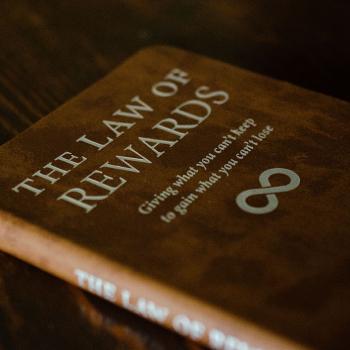
One of our readers sent this question: “I got the impression from Money, Possessions and Eternity or The Treasure Principle that you don’t believe we will receive eternal rewards for money we leave to God’s kingdom in our wills, after we die. I’m thinking of a very godly man who left his wealth in a foundation. What about all the good his foundation has done since he died? I personally benefited from it. Isn’t he being rewarded for that?”
I understand Scripture to teach that leaving instructions for what others are to do with our assets after we die does not equate with what we do with them while we’re alive. Hebrews 9:27 (NLT) says, “each person is destined to die once and after that comes judgment.”
Our Rewards Result from What We Actually Do on Earth
Suppose I leave a note telling my friend to say “I forgive you” to an abusive family member, after I die. That’s a nice gesture, but doesn’t God want me to trust Him enough to actually offer that forgiveness to that person while I am alive? At the very least, I believe that if God rewards us for leaving the note (He’s certainly free to do that—and He doesn’t have to clear it with me), He would reward us more for actually forgiving.
To put it in a biblical context, would Jesus have pointed to the woman who gave away her last two coins the same if she had died that day and left those same two coins to the temple charity in her will? I don’t think so. Would He be pleased she left them in her will, as opposed to wasting them or leaving them to the ungodly? Sure. But I don’t think the reward would be comparable.
I agree that you and others have been greatly blessed by the man you mentioned, who put a lot of money into a foundation. But of course, if all that money had been given away while he was alive, to help people in another corner of the world hear the gospel, their testimony might have been, “We’re sure glad he gave it to reach us and feed us rather than putting it in a foundation for later distribution.”
In that sense, testimonies cancel each other out. Citing evidence that something is a good thing doesn’t always prove it was actually the best thing. Since the alternative wasn’t done, there’s no one to speak up for having done it, so it’s hard to discern on that basis.
I think it’s possible we’ll be rewarded for making a choice to leave money to a worthy cause when we die. I’m not sure. There’s no biblical proof either way, but I think there’s biblical implication against it. And if there is a reward, I think it’s likely to be less.
But I still think God rewards our faith and sacrifice in this present life. It takes no faith or sacrifice to leave stuff behind when you die, since hanging onto it isn’t an alternative. One way or the other it will stay here. In fact, if we die possessing great wealth, we’ve held onto these treasures until the last possible moment, which doesn’t seem open-handed but tight-fisted.
Leaving and Giving Are Not the Same Thing
Giving is choosing to part with something, while leaving is simply controlling the destination of what you couldn’t hold onto anyway. Scripture doesn’t say, “Test me in this by leaving your assets after you die and see if I won’t open the floodgates of Heaven.” It calls upon us to give now. Jesus didn’t say, “Leave and it will be left to you in the measure you leave” but “Give and it will be given to you in the measure you give” (Luke 6:38).
Giving is voluntarily parting with money. The “voluntary” is as key as faith and sacrifice. Suppose someone stole a million dollars from a bank account and gave it to famine relief. Arguably, the million will do just as much good that way as if the account owner willingly given it. But would the reward be the same? No.
There’s something self-protective and counter to faith about hanging on to excessive wealth. Now, the man you mentioned (who I certainly respect from all I’ve heard about him)—I assume—held onto his as a kingdom-building strategy. And great outcomes have resulted. But if he had held onto it out of fear of letting go or out of unwillingness to surrender control to the Lord (and I don’t think or presume that was the case), the situation and outcome would be different.
Also, as Jesus had unique plans for Peter and John, He has unique roles for each of us. This man may have precisely followed Christ’s leading for him, while His leading for others—taking into account the same biblical principles—may look very different. Of course, God rewards us in keeping with what He wants us to do. So if God instructs us to leave our funds in a foundation rather than liquidate and give them while we are still alive, God will reward us accordingly.
It’s Never Wrong to Give Now
When we stand before God, I don’t believe He will say to us, “I’d like to say well done, but you really blew it when you gave me all that money rather than hanging on to it a few years longer.”
The only antidote to materialism is giving. It’s what will free you from the gravitational hold of things. People sometimes ask, should I give now or later? Should I give when the market is high, or should I hang on to my assets longer in the hopes I’ll have more to give later? You have to ask God those questions.
Here’s my question: How soon do you want to be free?
God is capable of producing much greater returns on money invested today than the stock market or real estate can produce. God didn’t say to the poor widow, “You should have invested that money and not given it to me until you could first make a tidy profit.”
If we don’t give today, there are real risks:
1) The economy may change, and we’ll have less to give.
2) Our hearts may change. God works in our hearts and moves us toward His kingdom. When we leave our treasure outside the kingdom today, our hearts stay outside too. For the sake of your spiritual life and your eternal reward and your example to your family: don’t miss the chance to solidly move your heart to God’s kingdom by moving your treasure there.
There’s a huge danger whenever we procrastinate obedience. When God speaks and tells you to pray, pray now. When He tells you to read His Word, read it now. When He tells you to share your faith, share it now. When He tells you to turn off the TV, turn it off now. When He tells you to give, give now.
Don’t just make plans to pray and read and share and give. Nothing is more fleeting than the moment of conviction. To procrastinate obedience is to disobey.
3) Our lives may end before we’ve given it. “No problem—I’m putting it in my will.” Can I say this gently? By all means do your estate planning and give heavily to missions. But giving is more than just designating where it goes after it’s not mine anymore. Giving is parting with it when I don’t have to, but choose to anyway, when it requires trusting God.
James wrote, “Don’t say tomorrow I’m going to go out and make this much money, because you don’t know what will happen today” (4:13-17).
John Wesley received a lot of book royalties—and his goal was to have nothing left when he died. And he did. Personally, I think that’s a great goal. “But what about our children?” Your children should work for a living, love God, and trust Him. They shouldn’t be waiting for a windfall when you die. It’s God’s job to take care of them, not yours.
If I were the devil, and I wanted to ruin Christians, I’d try to get their parents to leave them large amounts of money. Unearned wealth is a burden and a temptation. Most often It leads to moral corruption, waste, dependence on a higher standard of living, and the breakdown of family. (See studies of lottery winners and heirs.)
Talk to your kids. If they’re godly, they’ll commend you for giving to God’s kingdom. If they’re not godly, the last thing you should do is leave them money to subsidize a sinful lifestyle. God has a higher purpose for entrusting money to us than destroying our children’s character. (See Should We Leave Our Children Inheritances?)
Buy up Shares in Eternal Investments
God’s not going to look at you at the judgment seat and say, “I have one thing against you—you gave too much to missions, you invested too much in my kingdom.” It’s not going to happen. I guarantee you’ll never be sorry you made this kind of investment. Today the church is infected with prosperity theology, the gospel of health and wealth. God does promise to bless givers, but His primary purpose in providing is not to increase our standard of living, but our standard of giving.
Photo: Unsplash













